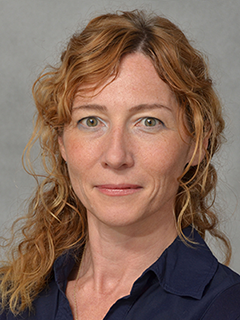Jan. 21, 2020:
 Veronika Bachanova, MD, PhD, associate professor of medicine, Division of Hematology, Oncology and Transplantation at the University of Minnesota, has been appointed to represent the University of Minnesota on the Big Ten Cancer Research Consortium Steering Committee.
Veronika Bachanova, MD, PhD, associate professor of medicine, Division of Hematology, Oncology and Transplantation at the University of Minnesota, has been appointed to represent the University of Minnesota on the Big Ten Cancer Research Consortium Steering Committee.
The Steering Committee is composed of one researcher from each Big Ten CRC member institution and meets on a regular basis to review activities of the consortium and decide matters of policy. The Steering Committee determines the criteria for approving concepts for development with the Big Ten CRC.
Dr. Bachanova, a medical oncologist, bone marrow transplant physician, and investigator at Masonic Cancer Center, University of Minnesota, currently serves as Section Head of Hematologic Malignancies, Cell therapies clinical director, and leads the university’s lymphoma interdisciplinary team. Her research focus is in translational research in the areas of lymphoma and immunotherapy.
“My aim is to build and expand the hematologic malignancy program integrating clinical care with cutting-edge research to improve the lives of patients treated at University of Minnesota,” Dr. Bachanova said. “My efforts as a Section Lead are focused on faculty members developing their careers and to facilitate their creativity and passions, both academically and clinically. On the research side, I design and conduct early phase clinical trials for patients with lymphoma and leukemia.”
Dr. Bachanova is currently researching strategies to improve metabolic health of immune effectors and is exploring the broader use of small molecule nicotinamide to improve the function of blood-derived Natural Killer (NK) Cells. The NK cells co-cultured with nicotinamide (NAM) and combined with rituximab are used to treat relapsed or refractory Non-Hodgkin lymphoma and multiple myeloma. She is leading the investigator-initiated clinical trial, “A Phase I Trial Testing NAM Expanded Haploidentical or Mismatched Related Donor Natural Killer (NK) Cells Followed by a Short Course of IL-2 for the Treatment of Relapsed/Refractory Multiple Myeloma and Relapsed/Refractory CD20+ Non-Hodgkin Lymphoma,” NCT03019666.
Dr. Bachanova recently presented an update on her research at the 61st annual meeting of the American Society of Hematology (ASH), that illustrated that treatment using NAM-NK cells is well tolerated and resulted into promising clinical activity.
Dr. Bachanova is currently a principal investigator of a Big Ten CRC study, BTCRC-HEM15-027, which tests the combination of nivolumab and ruxolitinib in relapsed or refractory classical Hodgkin lymphoma. She is also working with several companies on modified CAR T-cell therapy to enhance activity and make treatments safer.
She said she is thrilled and motivated to be a part of the Big Ten CRC Steering Committee, where she plans to work with colleagues to streamline the process of clinical trial development, so patients can gain quicker access to potentially effective new treatments.
“I deeply care about clinical research and bringing clinical trials to our patients,” Dr. Bachanova said. “The Big Ten Cancer Research Consortium enables us to accrue study participants quickly and allows us to be competitive in developing new drugs and combinations. The collective clinical and research expertise among Big Ten universities has incredible potential in the development of new treatments and advancing science.”
Dr. Bachanova said samples collected through Big Ten CRC studies are a valuable resource for investigators who want to explore additional correlative research.
“I would like to see Big Ten researchers increase the utilization of stored samples and ask questions to understand heterogeneity in response and toxicity. Interactions of clinicians with basic labs is one of the largest strengths and opportunities within the Big Ten CRC,” Dr. Bachanova said. “Through correlative work and translational research, we can better understand biomarkers and predictors of cancer.”
About the Big Ten Cancer Research Consortium: The Big Ten Cancer Research Consortium was created in 2013 to transform the conduct of cancer research through collaborative, hypothesis-driven, highly translational oncology trials that leverage the scientific and clinical expertise of Big Ten universities. The goal of the Big Ten Cancer Research Consortium is to create a unique team-research culture to drive science rapidly from ideas to new approaches to cancer treatment. Within this innovative environment, today’s research leaders collaborate with and mentor the research leaders of tomorrow with the unified goal of improving the lives of all patients with cancer.
About the Big Ten Conference: The Big Ten Conference is an association of world-class universities whose member institutions share a common mission of research, graduate, professional and undergraduate teaching and public service. Founded in 1896, the Big Ten has sustained a comprehensive set of shared practices and policies that enforce the priority of academics in the lives of students competing in intercollegiate athletics and emphasize the values of integrity, fairness and competitiveness. The broad-based programs of the 14 Big Ten institutions will provide over $200 million in direct financial support to almost 9,500 students for more than 11,000 participation opportunities on 350 teams in 42 different sports. The Big Ten sponsors 28 official conference sports, 14 for men and 14 for women, including the addition of men’s ice hockey and men’s and women’s lacrosse since 2013. For more information, visit www.bigten.org.
















Subscribe to the Big Ten CRC Newsletter X
X Facebook
Facebook YouTube
YouTube